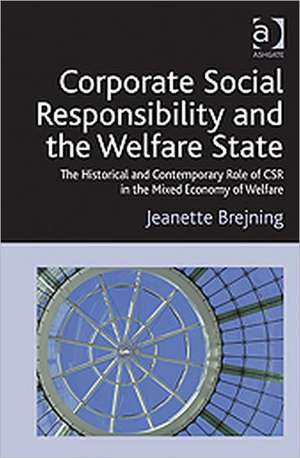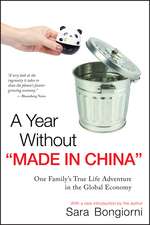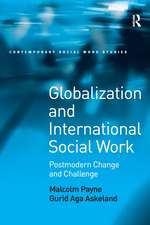Corporate Social Responsibility and the Welfare State: The Historical and Contemporary Role of CSR in the Mixed Economy of Welfare
Autor Jeanette Brejningen Limba Engleză Hardback – 28 dec 2011
| Toate formatele și edițiile | Preț | Express |
|---|---|---|
| Paperback (1) | 331.87 lei 6-8 săpt. | |
| Taylor & Francis – 19 oct 2016 | 331.87 lei 6-8 săpt. | |
| Hardback (1) | 821.46 lei 6-8 săpt. | |
| Taylor & Francis – 28 dec 2011 | 821.46 lei 6-8 săpt. |
Preț: 821.46 lei
Preț vechi: 1141.39 lei
-28% Nou
Puncte Express: 1232
Preț estimativ în valută:
157.19€ • 168.09$ • 131.06£
157.19€ • 168.09$ • 131.06£
Carte tipărită la comandă
Livrare economică 17 aprilie-01 mai
Preluare comenzi: 021 569.72.76
Specificații
ISBN-13: 9781409424512
ISBN-10: 1409424510
Pagini: 208
Dimensiuni: 156 x 234 x 18 mm
Greutate: 0.54 kg
Ediția:1
Editura: Taylor & Francis
Colecția Routledge
Locul publicării:Oxford, United Kingdom
ISBN-10: 1409424510
Pagini: 208
Dimensiuni: 156 x 234 x 18 mm
Greutate: 0.54 kg
Ediția:1
Editura: Taylor & Francis
Colecția Routledge
Locul publicării:Oxford, United Kingdom
Notă biografică
Jeanette Brejning is Honorary Fellow in the School for Policy Studies, University of Bristol, UK
Recenzii
'The contribution of CSR to the mixed economy of welfare has not been given the attention it requires and deserves in social policy analysis. This book seeks to put this right. It should be read by anyone with an interest in how corporations contribute (or should contribute) to the welfare of their various stakeholders in society, including students of social policy, public policy, the sociology of work, business and management studies and human relations.' Kevin Farnsworth, University of Sheffield, UK 'The idea of corporate social responsibility has acquired growing significance in a world where corporate power may now have greater influence over people's wellbeing and life chances than the power of nation states. Jeanette Brejning's new book explores the multiple meanings and underlying potential of an idea that has hitherto been largely neglected in the social policy literature.' Hartley Dean, London School of Economics and Political Science, UK 'Jeanette’s Brejning’s book discusses an important, yet frequently ignored, part of the corporate social responsibility (CSR) debate: the relationship between a firm’s social responsibilities and the welfare state. Discussing this topic is a much-welcomed addition to existing scholarly work on the nature and impact of CSR... Brejning’s detailed and well-written inquiry into the role of the welfare state looks at CSR less from a corporate angle, but instead explores its embeddedness into multi-actor governance structures reaching from state-based regulation to transnational soft-law mechanisms... Overall, the book offers a very interesting and refreshing journey into unexplored ’CSR territory’. For all those who look for scholarly perspectives that reach beyond the widespread discussions of CSR’s business benefits, this book has a lot to offer. Given that the relationship between CSR and the state is not yet sufficiently explored, this book is a must-read for anyone interested in developing a broader unders
Cuprins
Chapter 1 Introduction; Part I Theory and Concepts; Chapter 2 Theoretical Framework; Chapter 3 Corporate Social Responsibility; Part II A History of Corporate Social Responsibility in the Mixed Economy of Welfare; Chapter 101 Introduction to Part II; Chapter 4 Connections between CSR and Nineteenth-century Philanthropy; Chapter 5 CSR as Social Policy; Chapter 6 CSR, Globalization and Anti-globalization; Chapter 102 Conclusion to Part II; Part III Case Study; Chapter 103 Introduction to Part III; Chapter 7 Is There a ‘Social Case’ for Corporate Social Responsibility? Views on the Social Impacts of CSR; Chapter 8 CSR and the Changing Welfare State; Chapter 9 Conclusion;
Descriere
Based on interviews with a wide spectrum of people who work with CSR in England, Denmark and in the EU Commission, the book argues that when CSR is linked to social exclusion it is a way of renegotiating responsibilities in mixed economies of welfare. By situating CSR within the conceptual framework of the mixed economy of welfare and using Historical Institutionalism as a theoretical perspective to explore and explain the relationship between the welfare state and CSR, this book makes an innovative contribution to critical debates in comparative social policy.
















